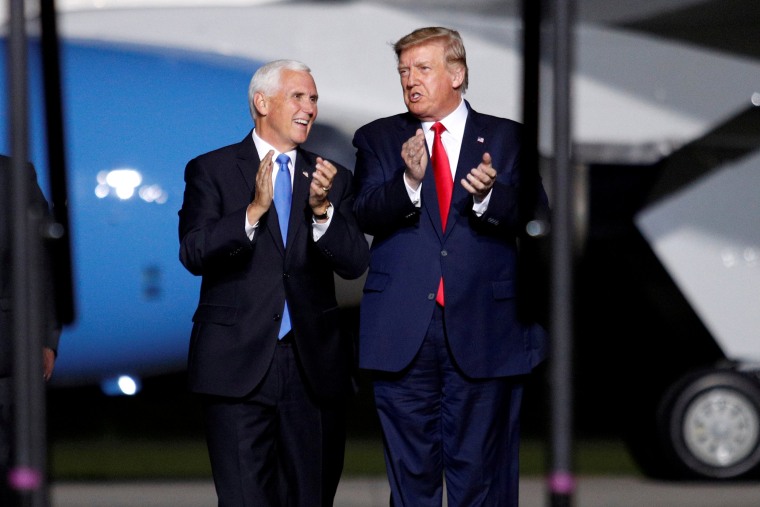Now the hard work begins.
In the middle of a surging pandemic, to call the next three months of our government a "lame duck" period is a fatal mistake. The consequences of the decisions made between now and Jan. 20 — in infections, hospitalizations and deaths — will shape our nation for years to come. A peaceful, seamless, effective and urgent transition, specifically focused on stopping the spread of Covid-19, could save tens of thousands of lives. As Barack Obama said following his election as president during the financial crisis of 2008, "We don't have a minute to waste."
In the middle of a surging pandemic, to call the next three months of our government a "lame duck" period is a fatal mistake.
President-elect Joe Biden has defeated President Donald Trump amid the multiple crises of economic collapse and civil unrest, shaped and augmented by the greatest public health crisis in a century. And unfortunately, our nation is now approaching the most dangerous period of this pandemic. More than 100,000 people in the United States are diagnosed with the infection every day, and because of inadequate testing, we are likely to be missing a majority of new cases.
According to my calculations and the COVID Tracking Project, the number of coronavirus hospitalizations has increased dramatically since Labor Day, and more than 1,000 people in the U.S. are losing their lives every single day to this virus. More concerning — we are not on a pathway out of the crisis. This past week was one of the worst weeks of the pandemic. This week will likely be worse. Next week will be worse yet.
Given where things stand, we do not have the luxury of waiting until January to act. We must model this transition on the handoff from President George W. Bush to Obama in the midst of the 2008 recession. During that time, Bush prioritized national interests over partisan scorekeeping, proactively reaching out to the Obama team to establish a council to coordinate his administration's handoff and speed the nominations of key officials in the next administration.
The Bush and Obama teams collaborated closely on the colossal Troubled Asset Relief Program, or TARP — a $700 billion stimulus package to halt the cascading collapse of the economy. While it was politically controversial, it would have been easy for Bush to leave such difficult political choices to his successor. He did not. He knew that the nation needed prompt, effective and coordinated action. "I told the American people, and I told the president-elect when I first met him, that any time we were to make a big decision during this transition, he will be informed, as will his team," Bush said Nov. 24, 2008.
Obama seized the opportunity to hit the ground running, saying, "Our families can't afford to keep on waiting and hoping for a solution." Two days after his election, he convened an economic advisory board to meet at the White House to work with the Bush administration to manage the financial crisis. Obviously, there were important areas of disagreement between the Obama and Bush teams, but both sides kept the greater goal of the national welfare in view. Days before Obama's inauguration, Bush called on Congress to release the second round of $350 billion of TARP funds — at Obama's request.
This transition is different, of course. But the American people, whether they voted for Biden or Trump, should demand that both sides find a way to move forward together.
This transition is different, of course. But the American people, whether they voted for Biden or Trump, should demand that both sides find a way to move forward together.
So what would such a united approach look like over the next three months, in the teeth of an even more lethal crisis? Let's start with three main areas.
The Trump administration, which has been less than forthcoming with crucial data about the pandemic over the past nine months, should immediately give the Biden team access to the full range of data collected by federal agencies to allow the incoming administration to formulate effective, evidence-based policies based on the best data. Biden has already announced the members of his Covid-19 task force, including a variety of widely respected experts.
Like Bush, Trump must give equal time to Biden to communicate with the American public about the pandemic and our national response. In particular, Trump should allow career scientists in the federal government and scientists advising the Biden team to take the lead in communications around infections and the public health measures needed to prevent them.
Finally, the Trump administration must recognize the limits of its tenure and collaborate and compromise accordingly. Key elements of the pandemic response — including distributing newly approved vaccines — will fall to the next administration. Indeed, on Monday, the drug company Pfizer announced good news about its vaccine candidate's efficacy. The Trump administration should establish collaborative councils — like those convened by Bush in 2008 — to ensure that not a moment is lost in marshaling this and other crucial policy responses.
For two weeks or more, we have been consumed by this election, staying up late to watch returns and compulsively refreshing vote counts. Unfortunately, unlike us, the virus is not distracted by politics; it is resolutely nonpartisan and absolutely tireless.
America already faces a steeply uphill battle against a pandemic that rages uncontrolled. We cannot afford further self-inflicted injuries. If we lose the next three months to petty partisan bickering and stonewalling, tens of thousands of Americans will die unnecessarily. There is not a minute to lose.

